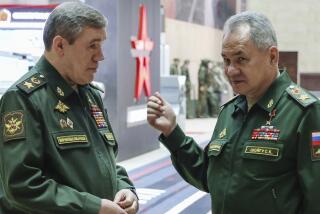Thousands march in Moscow, demand release of political prisoners
- Share via
MOSCOW -- Several thousand people demanding the release of political prisoners took to the streets of Moscow on Sunday in the biggest protest action so far this fall.
On a gray, overcast afternoon, protesters marched along Moscow’s central Boulevard Ring road carrying photographs of political prisoners, including business tycoon Mikhail Khodorkovsky and members of the band Pussy Riot.
This month marks 10 years of imprisonment for Khodorkovsky, a onetime oil baron who was the richest man in Russia. Two young women from Pussy Riot, a politically charged punk-rock group, were imprisoned last year. They have at least one thing in common: They challenged Russian leader Vladimir Putin.
Khodorkovsky openly supported opposition parties, and the Pussy Riot musicians performed a “punk prayer” at Moscow’s main cathedral, calling for Putin to be driven from power.
Other photographs carried by protesters Sunday showed more than two dozen activists detained on May 6, 2011, in an anti-Putin march that ended in clashes with police.
“Our task today is to mobilize enough people to compel the Kremlin to release the innocent victims of political repression from prisons,” opposition leader Alexei Navalny, who marched with his wife in the middle of the column, said in an interview.
The popular and charismatic anti-corruption crusader himself narrowly escaped a five-year prison term following his conviction in July for embezzlement of $500,000 from an obscure provincial timber company. Navalny was released on appeal, allowing him to run for mayor of Moscow in September.
Although he lost the race to the Kremlin-backed acting mayor, he gained impressive public support -- a likely reason, many experts believe, that his prison term was commuted earlier this month to a suspended sentence.
Navalny’s release may also have been a sign that with the approach of the 2014 Winter Olympic Games in the Russian city of Sochi in February, the Kremlin is prepared to make some concessions to its opposition and civil society groups.
The State Duma, the lower house of the Russian parliament, is about to consider a draft of a sweeping amnesty prepared by the Presidential Council on Human Rights at Putin’s request.
“The draft amnesty is very good, as it will allow the freeing of thousands of prisoners by the end of this year, including Khodorkovsky, Pussy Riot members and many other opposition activists,” Valery Borshchev, advisor to the Presidential Human Rights Envoy, said in an interview. “If passed the way we prepared it, it will also allow the dropping of charges against Greenpeace activists and let them free too.”
In the past week, charges against 30 Greenpeace activists held in the northern Russian port of Murmansk were reduced from piracy to hooliganism, which carries a maximum sentence of seven years in prison but may be subject to the amnesty, Borshchev said.
The activists were arrested in September after they tried to climb a Russian drilling platform in the Barents Sea to protest oil drilling in the Arctic.
The draft amnesty was submitted to Putin last week. He may introduce some changes before he gives his final approval, Borshchev said.
“We have a big chance to achieve this amnesty,” Boris Nemtsov, an opposition leader who served as deputy prime minister in Boris Yeltsin’s government, said to reporters during Sunday’s march. “Putin is afraid that leaders of Western countries will not attend his [Olympic Games]. Athletes may come but not Western leaders. So now is the best time for us to push toward our goal.”
As thousands were marching and chanting slogans such as “Russia will be free,” “Putin is a thief” and “Freedom to Putin’s hostages,” riot police stood on sidewalks but didn’t interfere.
Thousands of additional police sat at the ready in trucks that jammed nearby streets. No arrests were made, a striking contrast to most previous opposition rallies.
“I hope Putin displays some common sense for a change and frees those prisoners, among them many who were arrested for the so-called clashes organized by police themselves,” said Yelena Kukharenko, a 36-year-old research scientist. “Why have none of those nationalist thugs who took part in the racist pogrom in [southern] Moscow been arrested and charged with mass disorders like our activists were?”
Kukharenko was referring to anti-immigrant riots in Biryulyovo, a southern suburb of Moscow, where hundreds of nationalist youths beat up migrants, upturned and burned cars, smashed windows and vandalized property in shops and kiosks earlier this month following a killing of a Russian man, allegedly by a migrant worker from Azerbaijan. An Uzbek worker was knifed and killed the next day.
Several dozen of the rioters were detained by police but were released after a short time. A few were charged with hooliganism.
By contrast, 27 opposition activists who clashed with police at May 6, 2011, demonstrations on the eve of Putin’s inauguration were accused of mass disorders and face long prison terms if convicted.
Moscow police said about 4,500 people took part in the march Sunday. Organizers put the number at more than 20,000.
[For the record, 3:46 p.m. Oct. 27: A previous version of this post said Alexei Navalny had been convicted of embezzling $500. It was $500,000.]
ALSO:
NATO soldier wounded in latest Afghanistan insider shooting
Saudi officials set up roadblocks against women’s ‘drive-in’ protest
Egypt crackdown complaint against Nobel laureate tossed out by judge
More to Read
Sign up for Essential California
The most important California stories and recommendations in your inbox every morning.
You may occasionally receive promotional content from the Los Angeles Times.










